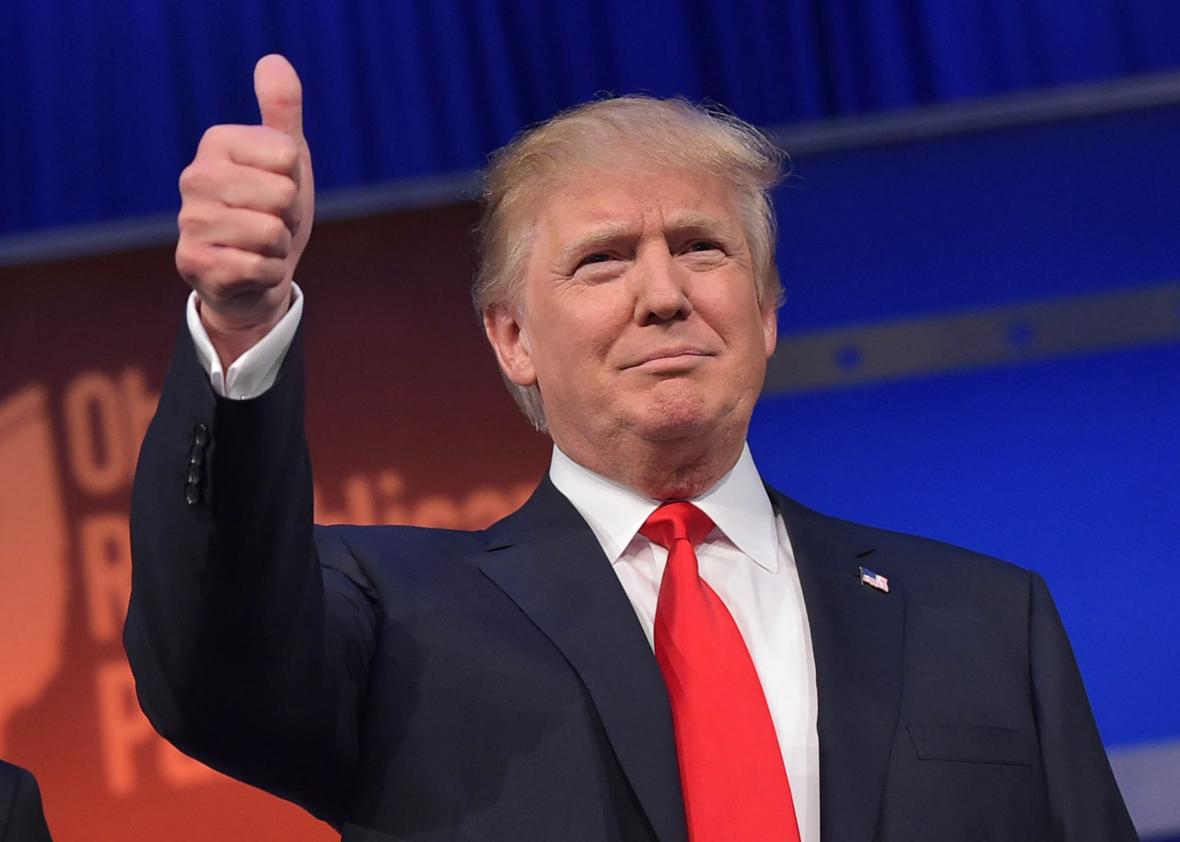Trump Blocks Biggest Tech Deal in History: Here's Why
President Donald Trump won't allow Broadcom's bid for Qualcomm. And there are major reasons why.
President Donald Trump on Monday (Mar. 12) blocked what would've been the biggest tech acquisition in history.

In a move that would have sent shockwaves through the technology industry, Broadcom floated the idea of acquiring Qualcomm in a hostile takeover worth $117 billion. The deal had been under scrutiny from regulators and others, and would have seen the Singapore-based Broadcom officially take over the U.S.-based Qualcomm.
But in an executive order on Monday, Trump said that "there is credible evidence" to suggest that a Broadcom takeover would be a problem. He specifically said that he feared that Broadcom "might take action that threatens to impair the national security of the United States" if it acquired Qualcomm. Trump's executive order went on to block the slate of Broadcom-nominated candidates who were to stand for a vote on Qualcomm's board of directors.
While Trump didn't share any of the "credible evidence" he says he saw, he gave the U.S. Attorney General full power to enforce his order and ensure Broadcom backs away.
"It is not that rare for the government to block acquisitions, said Avi Greengart, research director for connsumer platforms and devices at GlobalData. "What is unusual is blocking the sale on national security grounds for a non-defense-related company. There is certainly an argument that wireless IP/semiconductors are essential to national security."
But there may be more to the decision than just Broadcom. Bloomberg argued on Tuesday (Mar. 13), citing sources, that China-based Huawei might be to blame.
MORE: The Truth About 5G: What's Coming Soon (and What's Not)
Get instant access to breaking news, the hottest reviews, great deals and helpful tips.
While Huawei wasn't a part of the deal and didn't try to make a run at Qualcomm or Broadcom, there's growing concern in the U.S. that China is gaining too much control over the mobile Internet infrastructure and other components that the U.S. is increasingly relying upon. Bloomberg argues that Trump was concerned that a Broadcom takeover of Qualcomm would have allowed the Singapore-based company to weaken Qualcomm and therefore strengthen Huawei.
A panel that advises the President on business deals that could affect national security, the Committee on Foreign Investment in the U.S., also feared the somewhat strong ties between Huawei and Broadcom.
In interviews with the BBC, analysts said that Trump's decision was also protectionist. Mario Morales at IDC told the BBC that every major country around the world is in a race to deliver 5G technology. By allowing Qualcomm to slip into the hands of a foreign country, the U.S. would be left behind.
"Semiconductor technology and companies like Qualcomm will be an important weapon in that 5G arms race [and] the US like other nations and regions want to be first," Morales told the BBC.
Stuart Carlaw, chief research officer at ABI Research, sees this development as "a very positive event not only for Qualcomm but also for the market as a whole. The combined entity would have had dangerously dominant positions in some core markets such as location technologies, Wi-Fi, Bluetooth, RF hardware and automotive semiconductors.
The analyst cited the need for a diverse supplier ecosystem as it applies to IoT and mobility, as well as smart manufacturing.
While GlobalData's Greengart sees the rationale for this particular move, he's concerned about the precedent it may set.
"The risk is that this standard could be broad enough to include practically anything, and this is happening at the same time as President Trump is also trying to impose tariffs and trade restrictions," said Greengart.
Don Reisinger is CEO and founder of D2 Tech Agency. A communications strategist, consultant, and copywriter, Don has also written for many leading technology and business publications including CNET, Fortune Magazine, The New York Times, Forbes, Computerworld, Digital Trends, TechCrunch and Slashgear. He has also written for Tom's Guide for many years, contributing hundreds of articles on everything from phones to games to streaming and smart home.
-
shoe3548 Good for the president, protect our industry from China and N Korea, they are out to do the US harmReply -
mensa517 All and well, however, this sounds like a case of the pot calling the kettle black as the United States itself has ordered tech companies to allow back doors into all our user tech so our government can snoop /spy on us. The irony is the majority of our technology is made in China, which already inserts spy wear into it. So this may perhaps be overkill or a case of the fox guarding the hen house.Reply -
pocketchange The Good Old' USA is THE Cash Cow for the ENTIRE planet, for more than money. Until the citizenry gets a handle on this tidbit of common sense and does something other than roll over like a puppy, we as a Nation will continue to flow down the Crapper, as we have done since the early 60s. President Trump is the first in a long line of politicians to stand UP for this country. GOD BLESS HIM. Face the truth before we as a Nation, have nothing left. I for one, am pleased with the direction things are turning in favor of the USA. The balance of trade, is an awakening, akin to a bucket of cold water in the face. GO get the FLOATERS President Trump.Reply -
mensa517 And what's your point? All you are doing is ranting in support of trump. Your reply has nothing to do with the issues. Trade and such is determined by a consortium of countries, rich billionaires, the banking systems and so called elite5. Trump has no control over that. All he's doing is driving prices up for the everyday man to enrich himself and his cohorts. Take your tunnel vision goggles off, wake up and stop being a sheep. Or does your brain hurt when you think?Reply -
mdwfield For someone calling himself 'MENSA' that's a remarkably stupid comment. Trump's tariffs MAY increase consumer prices, but they will absolutely cut profits for company owners, either by increasing manufacturing costs through higher steel and aluminum prices or by increasing consumer prices and therefore lowering volumes. Generally speaking, manufacturing CXOs would love to use the cheapest materials possible. But American companies are increasingly being out-competed by lower wage off-shore companies, either being driven out of business or being bought up one division at a time. At some point, we will be out of companies to sell off and out of land to sell off, and at that point it will be pretty much impossible to recover.Reply
For decades we have squandered our status as the world's most profitable market. It's past time we stop the loss of American manufacturing while we still own some of the companies and possess some manufacturing knowledge. Corporate tax rate cuts were a good first step; these tariffs are a good second step. -
mensa517 Stupid? Obviously your inbred brain can't handle the truth. But it's par for the course for people like you to not understand economics and make pusillanimous commentary. Just who do you think these increased costs will be passed on to? When consumers have to spend more money on cheaper material products as you put it, while manufacturers increase prices, it means spending will slow down causing a collapse in the GNP, CPI etc and we all suffer. As well, the smoke screens and mirrors of a tax cut to the everyday man is nullified, placing them 2 steps back, it's called bait and switch idiot and only benefits the companies, traders and other rich. Continue supporting your moron in chief while dancing your way to the poor house. ENJOY THE SNAKE BITE FROM TRUMP YOU JUST RECEIVED. CYA INBRED.Reply -
navynasa22 I think you commenters are taking the reasons for face value without thinking about the possibility that Broadcom is possibly a conspirator with the NSA and selling to a foreign company would mean telling foreigners about all the secret spying done using Broadcom hardware. It's not hypocritical, it's protective.Reply -
Rexer As much as I love cheap components, I think getting our tech manufacturing and our resource industries restarted is a good thing. I remember Todd Ship Yard in San Pedro, CA would build huge ships are now an off loading dock for imports. We helped many Asian countries become tech savy and brought their living standards up. I'd like to return to #1 in technology, too. I think it's a good we begin selling 'Made in U.S.A.' and exporting again.Reply
